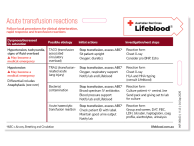Minor allergic reactions
When to suspect this adverse reaction
Presence of localised to widespread urticaria (hives) and pruritus (itchiness) with no other symptoms.
Other signs such as upper respiratory symptoms (i.e. dyspnoea, angioedema, stridor, bronchospasm or wheeze), nausea, vomiting, abdominal cramps or diarrhoea may be seen in anaphylaxis reactions.
Occur in 1% to 3% of transfusions.
Usual causes
Hypersensitivity to allergens or plasma proteins in the transfused unit. Rarely may be due to donor medication or antibodies from a donor with allergies.
What to do
Stop the transfusion immediately and follow the other steps for managing suspected transfusion reactions.
Antihistamines may be given. Once the reaction subsides, it is reasonable to restart the transfusion at a slower rate under close observation and complete it within four hours of commencement.
Consult a haematologist before administering additional blood components.
Continue to monitor the patient in case their condition progresses to a severe allergic reaction (anaphylactoid reaction or anaphylaxis).
Consider premedication and/or washed red cells if the patient has recurrent moderate to severe allergic reactions.
Investigation
No investigations are required.
Updated June 2025

